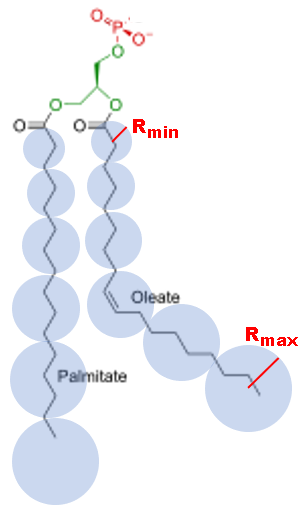\(\renewcommand\AA{\unicode{x212B}}\)

This fitting function models the elastic incoherent intensity of a linear polycarbon chain (alkyl) where the local diffusion of each unit in the chain is modeled as undergoing continuous diffusion but confined to a spherical volume whose radius varies from a minimal value \(r\) to a maximum value \(R\) [1].
\(r\) and \(R\) units are inverse of \(Q\) units. Because of the spherical symmetry of the problem, the structure factor is expressed in terms of the \(j_l(z)\) spherical Bessel functions.
Related functions: - EISFDiffSphere - ElasticDiffSphere - InelasticDiffSphere - DiffSphere
| [1] |
|
Example - fit of Q-dependence:
from __future__ import print_function
q = [0.3, 0.5, 0.7, 0.9, 1.1, 1.3, 1.5, 1.7, 1.9]
# A=2.0, r=0.12, R=1.6, M=9
eisf = [1.96561499215648, 1.90667574712235, 1.82327109734092,
1.72075639596568, 1.60529662348532, 1.48322421137169,
1.36043655237770, 1.24191091785048, 1.13138963884055]
w = CreateWorkspace(q, eisf, NSpec=1)
results = Fit('name=EISFDiffSphereAlkyl, M=9', w, WorkspaceIndex=0)
print(results.Function)
Output:
name=EISFDiffSphereAlkyl,M=9,A=2,Rmin=0.12,Rmax=1.6
| Name | Default | Description |
|---|---|---|
| A | 1.0 | Amplitude |
| Rmin | 1.0 | Minimum radius, inverse units of Q. |
| Rmax | 2.0 | Maximum radius, inverse units of Q. |
Categories: FitFunctions | QuasiElastic
Python: EISFDiffSphereAlkyl.py (last modified: 2020-03-27)